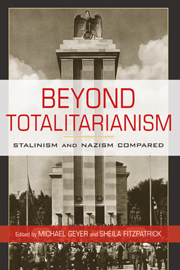5 - The Quest for Order and the Pursuit of Terror
National Socialist Germany and the Stalinist Soviet Union as Multiethnic Empires
Published online by Cambridge University Press: 05 June 2012
Summary
National Socialism and Stalinism both sought systematically to structure and classify a seemingly chaotic modern world. Classification here, however, should not be understood solely as the act of categorizing in order to grasp reality, for it is also an act of inclusion and exclusion. It is a violent act that forces others to submit to its ascriptions. And yet, while classification seeks to produce order from chaos, it ironically produces the very anarchy and ambiguity that it seeks to overcome.
The quest for order is a human necessity – everywhere and at all times. What characterizes the modern variant, however, is its demand for unambiguity and exclusivity – and, by extension, the ability to differentiate between legitimate and illegitimate order. What is excluded from ordered society loses any claim to equality; the excluded must either remove itself (for example, via assimilation, emigration, and so forth) or be forcibly removed. In this manner, the modern search for order not only produces ambivalence, it produces the very categories of humanity that it must then eliminate. This is how Zygmunt Bauman judged the character of modern dictatorship. One could further argue that terror and genocide were the flip sides of these efforts to construct a better world, a world cleansed of the excluded.
Empire emerged as the site in which utopian purity fantasies were implemented and, as necessary, redefined.
Information
- Type
- Chapter
- Information
- Beyond TotalitarianismStalinism and Nazism Compared, pp. 180 - 228Publisher: Cambridge University PressPrint publication year: 2008
References
Accessibility standard: Unknown
Why this information is here
This section outlines the accessibility features of this content - including support for screen readers, full keyboard navigation and high-contrast display options. This may not be relevant for you.Accessibility Information
- 3
- Cited by
